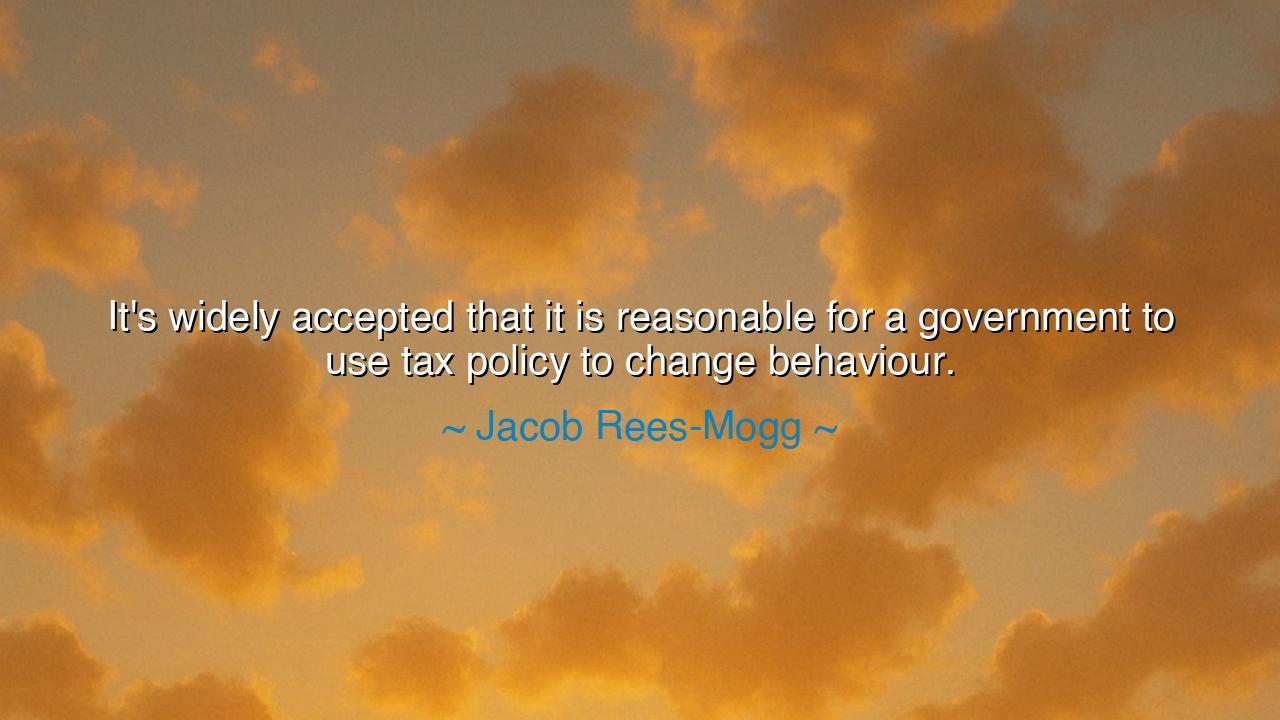
It's widely accepted that it is reasonable for a government to
It's widely accepted that it is reasonable for a government to use tax policy to change behaviour.






Host: The room was filled with the soft hum of evening settling in, the light outside fading into twilight. Jeeny sat at the table, her fingers lightly tracing the rim of a cup, deep in thought. Jack stood near the window, arms crossed, gazing out at the peaceful city below. The quiet between them felt like the calm before something insightful was about to unfold. Finally, Jack spoke, his voice calm, almost with a sense of analysis.
Jack: (his voice reflective) "It’s widely accepted that it is reasonable for a government to use tax policy to change behaviour."
Jeeny: (looking up, her voice soft, but curious) "That’s an interesting point. It speaks to the role of government not just in regulating and maintaining order, but also in guiding social behaviour. Using tax policy to influence choices, like incentivizing certain actions or discouraging others, is a powerful tool for shaping the direction of society."
Jack: (nodding slowly, his tone thoughtful) "Exactly. It’s a method that governments have used for a long time, whether it’s through subsidies, tax breaks, or penalties. The idea is that fiscal policy can be a lever for encouraging positive behaviours or discouraging negative ones. Whether it’s encouraging environmental practices or discouraging unhealthy habits, the government uses taxes as a way to influence the decisions of individuals and businesses."
Jeeny: (smiling softly, her voice calm) "It’s like using incentives to guide people toward making better choices. But it does raise questions about where the line should be drawn. At what point does it become too much intervention? How much influence is too much, and how do you ensure that the policy is fair and effective?"
Jack: (his voice calmer, almost with a hint of concern) "Yes, exactly. The challenge is finding the right balance. On the one hand, the government has a duty to create conditions that promote the public good. But on the other hand, there’s the issue of personal freedom. It’s important that the government’s role in influencing behaviour doesn’t feel like overreach, but rather a reasonable means of guiding society toward healthier, more sustainable choices."
Jeeny: (nodding thoughtfully, her voice reassuring) "Right. It’s a fine line between promoting the common good and respecting individual freedom. When tax policy is used effectively, it can nudge society in the right direction without taking away personal choice. But it’s important to ensure that the policies are transparent, well thought out, and genuinely effective in making a positive impact."
Jack: (his voice reflective, almost with a sense of resolution) "That’s where the effectiveness of these policies comes into play. It’s not just about using taxes to influence behaviour, but ensuring that those behaviours align with broader goals of sustainability, health, and fairness. Ultimately, it’s about using fiscal tools to create incentives that improve society, not just punish or restrict individuals."
Jeeny: (smiling warmly, her voice gentle) "Exactly. It’s about creating an environment where the policy benefits both society as a whole and individuals. Tax policy should empower people to make better choices, while also creating incentives that lead to a more balanced, sustainable, and fair society."
Host: The room seemed to settle into a deeper understanding. Jack and Jeeny had uncovered something important about the role of government in shaping behaviour: that tax policy, when used thoughtfully, can be a powerful tool for guiding social change. It’s not about control, but about creating incentives that lead to positive outcomes for both individuals and society as a whole. The world outside continued its rhythm, but inside, there was a quiet recognition that policy, when done right, can be an effective force for good.






AAdministratorAdministrator
Welcome, honored guests. Please leave a comment, we will respond soon